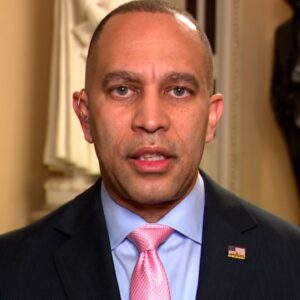President Donald Trump’s approval rating has remained strong, holding steady exactly one month after taking office and following a rapid introduction of his agenda. Despite some polls showing a decline in his favorability since his return to the White House, recent surveys suggest that most Americans continue to approve of his performance. A SurveyUSA poll of 2,000 adults found that 51 percent of respondents approve of Trump’s job as president, while 45 percent disapprove, giving him a net approval score of +6 points. Regionally, Trump has higher approval in rural areas (59 percent) compared to suburban (48 percent) and urban areas (51 percent). The SurveyUSA poll, conducted between February 13 and 16, had a margin of error of 2.6 percentage points.
A separate Morning Consult poll released around the same time showed a similar approval rating, with 50 percent of voters approving of Trump’s job as president and 47 percent disapproving. This represented a stabilization in Trump’s approval after three consecutive weeks of decline. Analysts noted that Trump’s approval and favorability ratings had stabilized, with voters slightly more likely to approve than disapprove of his job performance, at 50 percent to 47 percent. These numbers, which mirror his ratings at the same point in his first term, were based on a survey conducted between February 14 and 16, involving 2,217 registered voters.
Additionally, a poll conducted by the Republican firm RMG Research, which was founded by Scott Rasmussen, showed that Trump continues to enjoy a strong approval rating of 55 percent, with a disapproval rating of 43 percent, giving him a net approval score of +12 points. This poll, which surveyed 3,000 registered voters between February 10 and 14, highlighted that Trump’s approval rating has remained above 50 percent since his return to office, even peaking at 57 percent during his inauguration week. Despite some Americans not personally liking Trump or his behavior, a segment of the population believes that he is the right person for the job, especially in the context of his performance rather than personal favorability.
Alongside these approval ratings, a shift is occurring in how major corporations approach Diversity, Equity, and Inclusion (DEI) programs, a subject Trump campaigned on last year. Trump made strides last month by signing an executive order to eliminate DEI policies and staff within the federal government, extending the ban to federal contractors. While some private companies had already started scaling back DEI initiatives before Trump’s actions, his directive has prompted many businesses to reassess their DEI commitments, even if significant internal changes are slow to materialize. The future of DEI-driven hiring practices is now uncertain, as businesses face a complex and evolving legal landscape.




